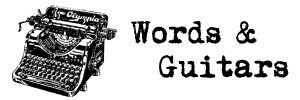Chapter & Verse: Desperate Journalist
The first in our series of bands and their books.

As the man with the quiff once sang, “There’s more to life than books, y’know? But not much more.”
While we wouldn’t go quite so far (crisp sandwiches, cat chins, bed), it would be curmudgeonly not to acknowledge the pleasures both simple and complex of a good book. All things considered, books are pretty great. And, of course, the link between books and music goes right back to when Oscar Wilde tried to put together his proto-jazz quintet, Lady Windermere’s Fan Club, but had to settle for writing instead after his drummer caught TB and the oboist ran away with the chimney sweep. Still, it’s a crossover that continues right up to the present day, with the festive book chart likely to see Brett Anderson’s Hot Rod: Adventures in The Used Car Trade go head-to-head with Jamie Oliver’s Aga Cooking On £1 A Day in the race for the number one slot.
So we like books and we like music and so came up with Chapter & Verse as a means to celebrate both. Man, we’re good. It’s a pretty simple concept: collar an artist or band and ask them to wax lyrical about a few of their favourite titles. And who better to kick things off than Desperate Journalist – a name that has uh … allusions to writing, but also because their brand of Brit indie has a intelligent, literary air that has grabbed us by the spines (ooh!) and folded our page corners right over.
Let’s hand you over to DJ for the introductions!
“Being as we are a band well versed in melancholy, we selected four of our favourite miserable books!”
Rob: Jude the Obscure – Thomas Hardy
‘Everyone always ends up dead or mad in Thomas Hardy books.’ – My Mum
This is perhaps the obvious choice given the shared moniker. Jude the Obscure was, for me, one of the most effective and devastating books I have ever read. Being the pseudo-intellectual Manic Street Preachers fan that I was during my teenage years (the past tense is, of course, not strictly correct), I spent significant amounts of time seeking out the most relentlessly harrowing texts I could find. The problem was that many of them turned out to be pretty dull. Nevertheless, I found two authors I could reliably turn to feed this silly fascination: Dostoyevsky and Thomas Hardy.
Jude the Obscure has a modernity – despite some of the more traditional themes of marriage and the church – in the way the book is paced. I still remember my absolute shock at suddenly turning the page to discover what Little Father Time has done – no spoilers! This ability to startle, whilst simultaneously illustrating the grinding, but no less devastating, procession of disappointments fuelled by social convention and ambition make this book uniquely disquieting.
Jo: Riddley Walker – Russel Hoban
Riddley Walker tells the story of a twelve-year-old boy’s attempt to survive in a post-nuclear-holocaust Kent. It’s one of those great pieces of literature which is both cleverly constructed and also beautiful in imagery and language. It’s like the Citizen Kane of books or something.
The story is communicated in the first person by the titular Riddley in a language that mixes old Kentish dialect and a kind of broken-apart, rudimentary version of modern English (complete with familiar jargon and slang) which both echoes the book’s theme of atomic/social/global fragmentation and makes reading completely immersive. Hoban has constructed the language in a way that follows some historical traditions of linguistic development, and the vocabulary itself offers some clues as to the way this future England has become the terrifying wasteland as the book progresses. There’s a brilliance how the reader comes to understand more about Riddley’s world than he does by dint of becoming more familiar with his speech (being as we are from the world which came before his). The prose is my favourite thing about this book – it is really startling and poetic, and reminiscent of the Norse Sagas or Old English epic poetry.
The environment Riddley and the other characters inhabit is also a fascinating one. The fact that it was humanity’s urge for scientific/political progression leading to an atomic explosion (known as the “1 big 1”) which resulted in their hostile surroundings has led to a culture of suspicion towards “clevverness”. Wild dogs roam the country and are frequently a cause of human death. Everything is dark and rainy and dangerous and everyone is frightened. The technological advancement of society such as we are shown is similar to that of the Iron Age, and the strength of mythology and fearful religion within everyone’s lives is an echo of that period of British history. Church and state are one and the same, and a strange mystical travelling puppet show is their main method of communicating propaganda to their citizens, based on misremembered history. Riddley discovers by accident that there is in fact a movement to restore “clevverness” and understand the truth of the events leading to the 1 Big 1, and the book goes on to tell the story of his progression towards that understanding.
I don’t want to explain the entire plot, but it’s an exciting, sad, strange story set in a brilliantly imagined world and told in a brutal, beautiful way. It’s my favourite book. If you like William Faulkner, A Clockwork Orange (film and book), the films of Ben Wheatley, OK Computer, Nausica of the Valley of the Wind, Einsturzende Neubaten, XTC albums 4-7, The Wicker Man and/or Beowulf, you will love it.
Caz: L’Écume des Jours – Boris Vian
One of the first books that made a huge impression on me when I was a young teenager. It was – and still is – so different from everything else. Boris Vian was also a jazz musician and maybe that’s why he had such a crazy imagination and freedom in writing. L’Écume des Jours tells the love story of Colin and Chloé and her fight against tuberculosis. The book’s universe is disconcerting as both poetic and surrealist. Its rules are absurd and it is built on idioms and metaphors taken literally. The tuberculosis is a water lily growing inside Chloé’s chest and the world and space change to reflect the characters’ feelings. When Colin and Chloé are alone in her room, the corners disappear and it becomes a cocoon. As the water lily grows and sadness and despair take over, the house starts shrinking, the air becomes unbreathable and the windows get so dirty that no light can enter the house. Their cleaner, who is a little mouse, tries its hardest to clean the windows but cannot. In the end, unable to cope with the despair around, it commits suicide by jumping into a cat’s mouth and Colin eventually dies of sadness.
The writing is full of music, metaphors, poetry, and plays on words so I’m not sure how well a translation could work. Maybe that’s why the book is not well known outside France. It’s one of the most original and saddest stories I’ve ever read. I also often think about the amazing “pianocktail” Colin owns which, for every melody you play, makes a cocktail that compliments how you feel when you hear that song…
Caz: Les Enfants Terribles – Jean Cocteau
Les Enfants Terribles is one of the only books which, once I got to the last page, I had to read again straight away. I didn’t want it to end. And I think I even cried. I read it when I was a teenager because it was the inspiration for ‘A Letter To Elise’ by The Cure. It’s about two twins: Elisabeth and Paul who are eventually orphaned. They have a very close and intense relationship and have built their own world in the room that they share. It’s the world of childhood: they build tents, have a treasure box, etc. They play “the game”, where they let loose their imaginations. They do everything to stay out of the real world of adults. The book tells the slow collapse of this perfect world. Love comes, along with jealousy. It’s the end of childhood and all the nostalgia and efforts to bring it back are in vain. I love that it’s built like a classic tragedy, with all its tragic misunderstandings: you know how it is going to end, but until the last page you have this stupid hope that everything might be fine…




